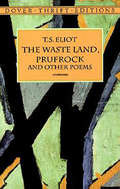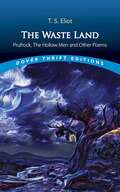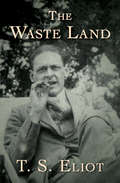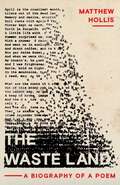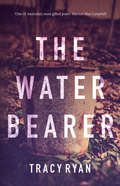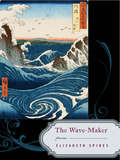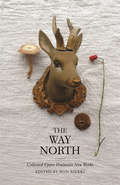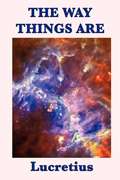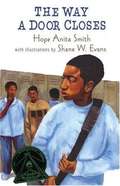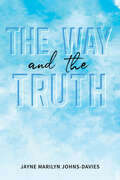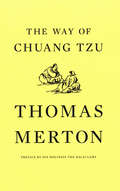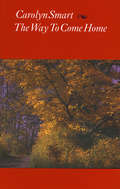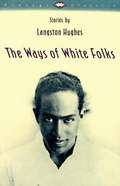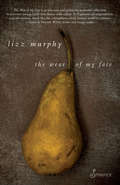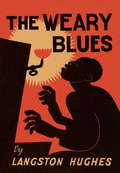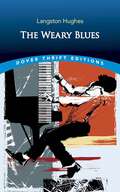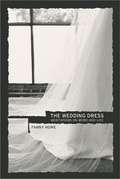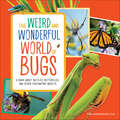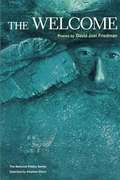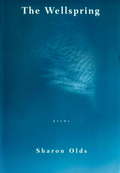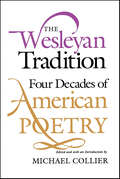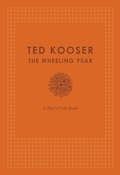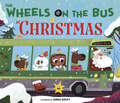- Table View
- List View
The Waste Land, Prufrock and Other Poems: Poems (Dover Thrift Editions)
by T. S. EliotIn the masterly cadences of T. S. Eliot's verse, the 20th century found its definitive poetic voice, an incredible "image of its accelerated grimace," in the words of Eliot's friend and mentor, Erza Pound. This volume is a rich collection of much of Eliot's greatest work.The title poem, The Waste Land (1922), ranks among the most influential poetic works of the century. An exploration of the psychic stages of a despairing soul caught in a struggle for redemption, the poem contrasts the spiritual stagnation of the modern world with the ennobling myths of the past. Other selections include the complete contents of Prufrock (1971), including "The Love Song of J. Alfred Prufrock," "Portrait of a Lady," "Rhapsody on a Windy Night," "Mr. Apollinax," and "Morning at the Window." From Poems (1920) there are "Gerontion," "The Hippopotamus," "Mr. Eliot's Sunday Morning Service," "Sweeney Among the Nightingales," and more.An indispensable resource for all poetry lovers, this modestly priced edition is also an ideal text for English literature courses from high school to college. Includes "The Love Song of J. Alfred Prufrock" from the Common Core.
The Waste Land, Prufrock, The Hollow Men and Other Poems (Dover Thrift Editions: Poetry)
by T. S. EliotThis superb collection of 26 works features the poet's masterpiece "The Waste Land"; the complete Prufrock and Other Observations, “The Hollow Men,” and the collection Poems.
The Waste Land: 75th Anniversary Edition (Longman Literature Guides)
by T. S. EliotThe masterpiece of Modernist poetry, offering a profound and kaleidoscopic meditation on Western life in the aftershocks of World War I. Famous for juxtaposing Eastern cultures with Western literary references, T. S. Eliot&’s The Waste Land has been celebrated for its eloquence, depth of meaning, and endlessly interwoven subtleties. Rich with allusions to the religious texts of Hinduism and Buddhism, Western literature, and Eliot&’s own life, the poem continues to provoke, inspire, and delight. First published in 1922, The Waste Land quickly ascending to the status of literary classic. It is widely considered to be Eliot&’s finest work, representing maturity in his style and confidence in both expression and research. This ebook has been professionally proofread to ensure accuracy and readability on all devices.
The Waste Land: A Biography Of A Poem
by Matthew HollisA riveting account of the making of T. S. Eliot’s celebrated poem The Waste Land on its centenary. Renowned as one of the world’s greatest poems, The Waste Land has been said to describe the moral decay of a world after war and the search for meaning in a meaningless era. It has been labeled the most truthful poem of its time; it has been branded a masterful fake. A century after its publication in 1922, T. S. Eliot’s enigmatic masterpiece remains one of the most influential works ever written, and yet one of the most mysterious. In a remarkable feat of biography, Matthew Hollis reconstructs the intellectual creation of the poem and brings the material reality of its charged times vividly to life. Presenting a mosaic of historical fragments, diaries, dynamic literary criticism, and illuminating new research, he reveals the cultural and personal trauma that forged The Waste Land through the lives of its protagonists—of Ezra Pound, who edited it; of Vivien Eliot, who sustained it; and of T. S. Eliot himself, whose private torment is woven into the seams of the work. The result is an unforgettable story of lives passing in opposing directions and the astounding literary legacy they would leave behind.
The Water Bearer
by Tracy RyanWater is contained in these poems in many different ways: from the water filling a second-hand cooler in an old farmhouse to ocean riptides and impassive dams; from swimming lessons to paddocks layered with water after rain. From scheme water, pipelines and a countryside in the grip of drought – the water in this collection is a many-sided metaphor. Tracy Ryan's latest collection of poems is full of intimate intensity and clear vision, each poem wrought with consummate skill by "one of Australia's most gifted poets" (Marion May Campbell).
The Wave-Maker: Poems
by Elizabeth SpiresA contemplative, witty new collection from a "jewel of a poet" (Los Angeles Times). In Elizabeth Spires's sixth collection of poetry, the pilgrim soul, in its various guises, meditates on its own slow becoming, finding humble companions in creatures as unlikely as a lowly snail, a prehistoric coelacanth, or a tiny Japanese netsuke of a badger disguised as a monk. For Spires, life is both a pilgrimage and a deepening--birth, death, and transformation all part of a seamless continuum. Possessed of a calm, crystalline sense of eternity, her poems invite fellow travelers to sit for a little while and be cleansed of the dust of existence.
The Way I Feel
by Janan Cain"Finally we have a resource which teaches children how to articulate what they feel, " wrote a health educator, who described The Way I Feel as "a beautifully illustrated and engaging book" for preschoolers and young children.
The Way North: Collected Upper Peninsula New Works
by Ron RiekkiMichigan's Upper Peninsula is distinct from the rest of the state in geography, climate, and culture, including a unique and thriving creative writing community. In The Way North: Collected Upper Peninsula New Works, editor Ron Riekki presents poetry, fiction, and non-fiction from memorable, varied voices that are writing from and about Michigan's Upper Peninsula. In all, this unique anthology features new works from forty-two writers, including rising star Ellen Airgood, Edgar Award-winner Steve Hamilton, Rona Jaffe Award-winner Catie Rosemurgy, Jonathan Johnson of Best American Poetry, Michigan Notable Book Award-winner Keith Taylor, and Michigan Author Award-winner John Smolens. In 49 poems and 20 stories-diverse in form, length, and content-readers are introduced to the unmistakable terrain and characters of the U.P. The book not only showcases the snow, small towns, and idiosyncratic characters that readers might expect but also introduces unexpected regions and voices. From the powerful powwow in Baraga of April Lindala's "For the Healing of All Women" to the sex-charged basement in Stambaugh of Chad Faries's "Hotel Stambaugh: Michigan, 1977" to the splendor found between Newberry and Paradise in Joseph D. Haske's "Tahquamenon," readers will delight in discovering the work of both new and established authors. The contributors range widely in age, gender, and background, as The Way North highlights the work of established writers, teachers, students, laborers, fishermen, housewives, and many others. The Way North brings the U.P.'s literary tradition to the awareness of more readers and showcases some of the most compelling work connected to the area. It will be welcomed by readers interested in new fiction and poetry and instructors of courses on Michigan writing.
The Way Things Are
by LucretiusDe rerum natura (The Way Things Are) is a 1st century BC didactic poem by the Roman poet and philosopher Lucretius with the goal of explaining Epicurean philosophy to a Roman audience. Lucretius presents the principles of atomism; the nature of the mind and soul; explanations of sensation and thought; the development of the world and its phenomena; and explains a variety of celestial and terrestrial phenomena. The universe described in the poem operates according to these physical principles, guided by fortuna, "chance," and not the divine intervention of the traditional Roman deities.
The Way a Door Closes
by Hope Anita SmithWith a click, a bang, a whisper-- or no noise at all. There are so many ways that a door can close, but it's not just the closing; it's the knowing. And thirteen-year-old CJ knows too much about losing his father.
The Way and the Truth
by Jayne Marilyn Johns-Davies“It is amazing how much information we absorb and retain as we develop and experience life – often listening to lectures or informative television programmes. It could be attending classes of subject interest, taking exams and more. Vocabulary expands all the time and what a place technology now has. People throughout history have been so clever and talented, inventive and artistically creative. I do hope these poems, based on the Bible, will be of help and interest, and food for thought for many, many people.” – Jayne Marilyn Johns-Davies
The Way of Chuang Tzu: A Personal And Spiritual Interpretation Of The Classic Philosopher Of Taoism (Shambhala Pocket Classics Ser.)
by Thomas Merton Dalai Lama XivClassic writings from the great Zen master in exquisite versions by Thomas Merton, in a new edition with a preface by His Holiness the Dalai Lama. Working from existing translations, Thomas Merton composed a series of his own versions of the classic sayings of Chuang Tzu, the most spiritual of Chinese philosophers. Chuang Tzu, who wrote in the fourth and third centuries B.C., is the chief authentic historical spokesperson for Taoism and its founder Lao Tzu (a legendary character known largely through Chuang Tzu's writings). Indeed it was because of Chuang Tzu and the other Taoist sages that Indian Buddhism was transformed, in China, into the unique vehicle we now call by its Japanese name--Zen. The Chinese sage abounds in wit and paradox and shattering insights into the true ground of being. Thomas Merton, no stranger to Asian thought, brings a vivid, modern idiom to the timeless wisdom of Tao.
The Way to Come Home
by Carolyn SmartThe Way to Come Home is Carolyn Smart's fourth book of poems. It is a collection that ranges from celebrating the rural landscape north of Kingston, Ontario to re-creating the painful last phase of her friend Bronwen Wallace's life in a moving sequence titled "The Sound of the Birds." The volume's opening sequence, "Cape of Storms," views the hatred thriving amid the astonishing physical beauty of South Africa while "The woman is bathing" details a journey to Costa Rica that is a journey into the self. The outward eye is as acute as the inward in this powerful book.
The Ways of White Folks: Stories
by Langston HughesIn these acrid and poignant stories, Hughes depicted black people colliding--sometimes humorously, more often tragically--with whites in the 1920s and '30s.
The Wear of My Face
by Lizz MurphyThe sun is our closest star just average a middle-aged dwarf past its prime but still a few billion years to go and fierce is its heat It's domains: interior surface atmospheres inner corona outer corona Did someone say Corona? The Wear of My Face is an assemblage of passing lives and landscapes, fractured worlds and realities. There is splintered text and image, memory and dream, newscast and conversation. Women wicker first light, old men make things that glow, poets are standing stones, frontlines merge with tourist lines. Lizz Murphy weaves these elements into the strangeness of suburbia, the intensity of waiting rooms, bush stillness, and hopes for a leap of faith as at times she leaves a poem as fragmented as a hectic day or a bombed street. What may sometimes seem like misdemeanours of the mind, to Lizz they are simply the distractions and disturbances of daily life somewhere. There is a rehomed greyhound, a breezy scientist, ancient malleefowl, beige union reps and people in all their conundrums. You might travel on a seagull's wing or wing through the aerosphere.
The Weary Blues
by Langston HughesNearly ninety years after its first publication, this celebratory edition of The Weary Blues reminds us of the stunning achievement of Langston Hughes, who was just twenty-four at its first appearance. Beginning with the opening "Proem" (prologue poem)--"I am a Negro: / Black as the night is black, / Black like the depths of my Africa"--Hughes spoke directly, intimately, and powerfully of the experiences of African Americans at a time when their voices were newly being heard in our literature. As the legendary Carl Van Vechten wrote in a brief introduction to the original 1926 edition, "His cabaret songs throb with the true jazz rhythm; his sea-pieces ache with a calm, melancholy lyricism; he cries bitterly from the heart of his race . . . Always, however, his stanzas are subjective, personal," and, he concludes, they are the expression of "an essentially sensitive and subtly illusive nature." That illusive nature darts among these early lines and begins to reveal itself, with precocious confidence and clarity. In a new introduction to the work, the poet and editor Kevin Young suggests that Hughes from this very first moment is "celebrating, critiquing, and completing the American dream," and that he manages to take Walt Whitman's American "I" and write himself into it. We find here not only such classics as "The Negro Speaks of Rivers" and the great twentieth-century anthem that begins "I, too, sing America," but also the poet's shorter lyrics and fancies, which dream just as deeply. "Bring me all of your / Heart melodies," the young Hughes offers, "That I may wrap them / In a blue cloud-cloth / Away from the too-rough fingers / Of the world."From the Hardcover edition.
The Weary Blues (Dover Thrift Editions: Black History)
by Langston HughesThe Weary Blues is Langston Hughes's first published collection of poems, immediately celebrated as a tour de force upon its release. Over ninety years after its publication, it remains a critically acclaimed literary work and still evokes a fresh, contemporary feeling and offers a powerful reflection of the Black experience. From the title poem "The Weary Blues," echoing the sounds of the blues, to "Dream Variation," ringing with joyfulness, to the "Epilogue" that mimics Walt Whitman in its opening line, "I, too, sing America," Hughes writes clearly and colorfully, and his words remain prophetic and relevant today.
The Wedding Dress: Meditations on Word and Life
by Fanny HoweThis selection of poetic essays constitutes an intellectual memoir by an award-winning poet and scholar. Howe meditates on the role of the artist, on her domestic and political life in Boston in the late 60s and 70s, and on the impact of theology and religion, particularly Catholicism, on her work and the work of others.
The Wedding Procession of the Rag Doll and the Broom Handle and Who Was in It
by Carl Sandburg Harriet PincusThe Rag Doll was blessed with many friends ― the Wisk Broom, the Furnace Shovel, and the Coffee Pot among them ― but when it came time to marry, she chose the Broom Handle. On the day of their wedding, the bride and groom were attended by a fantastical procession of well-wishers: the Spoon Lickers, the Tin Pan Bangers, the Easy Ticklers, the Musical Soup Eaters, and other whimsical characters, all marching along in a manner befitting their extraordinary names. This tale of wedding pomp and madcap mirth comes from poet Carl Sandburg's classic book of American fairy tales, The Rootabaga Stories. Marvelous drawings by Harriet Pincus, a noted illustrator of children's books, enhance the tale. Out of print for years, the book is now available in a new edition that introduces the story and its gloriously antic art to a new generation of parade-lovers, wedding-goers, and everyone who enjoys a fanciful celebration.
The Weird and Wonderful World of Bugs: A Book About Beetles, Butterflies, and Other Fascinating Insects
by Rea ManderinoFascinating facts and up-close photos to delight bug fans ages 5 to 7Calling all young bug enthusiasts! Come along on a journey into The Weird and Wonderful World of Bugs. Kids from ages 5 to 7 will learn all about the insects and other arthropods we call "bugs." They'll meet moths, bees, fireflies, spiders, and mosquitos in detailed, full-color photos that bring the bugs to life from antennae to abdomen. Entomologist Rea Manderino, PhD, offers scientific facts on every page, inspiring budding bug scientists to explore their backyards with new eyes.Discover intriguing facts like:More than one-third of all the insects on Earth are beetles. There are almost 390,000 species!Some ants are farmers! They bring leaves back to the nest and use them to grow fungus, which they feed to their babies.Pillbugs are a type of crustacean—like crabs—with many legs, a hard exoskeleton, and gills that need water to breathe.Leap, fly, and crawl into a big world of small wonders with this incredible bug book for kids.
The Welcome
by David Friedman"The fact is that The Welcome is full of pleasures, both linguistic and ideational. There's a philosophical intelligence behind it, one that will rarely allow itself the sobrieties of the philosophical. . . . David Friedman blends surreal hijinks with gestures toward the serious, At their best, an original voice guides a distinctive sensibility in these poems. They'll give you, if you let them, one of literature's underrated virtues: a good time. "--Stephen Dunn, winner of the 2001 Pulitzer Prize for Poetry
The Wellspring
by Sharon OldsSharon Olds's dazzling new collection is a sequence of poems that reaches into the very wellspring of life. The poems take us back to the womb, and from there on to childhood, to a searing sexual awakening, to the shock of childbirth, to the wonder and humor of parenthood--and, finally, to the depths of adult love.Always bold, musical, honest, these poems plunge us into the essence of experience. This is a highly charged, beautifully organized collection from one of the finest poets writing today.From the Trade Paperback edition.
The Wesleyan Tradition: Four Decades of American Poetry (Wesleyan Poetry Series)
by Michael CollierSince issuing its first volumes in 1959, the Wesleyan poetry program has challenged the reigning aesthetic of the time and profoundly influenced the development of American poetry. One of the country's oldest programs, its greatest achievement has been the publication of early works by yet undiscovered poetry who have since become major awarded Pulitzer and Bollingen prizes, National Book Awards, and many other honors. At a time when other programs are being phased out, Wesleyan takes this opportunity to celebrate its distinguished history and reaffirm its commitment to poetry with publication of The Wesleyan Tradition.Drawing from some 250 volumes, editor Michael Collier documents the wide-ranging impact of these works. In his introduction, he describes the literary and cultural context of American poetics in more recent decades, tracing the evolution of the Deep Image and Confessional movements of the 50s and 60s, and exploring the emergence of the "prose lyric" style. Although the success of the Wesleyan program has inspired its share of imitators, no other program has had such a fundamental impact. Works by the eighty-six poets included her both document and celebrate that contribution.
The Wheeling Year: A Poet's Field Book
by Ted KooserTed Kooser sees a writer’s workbooks as the stepping-stones on which a poet makes his way across the stream of experience toward a poem. Because those wobbly stones are only inches above the quotidian rush, what’s jotted there has an immediacy that is intimate and close to life. Kooser, winner of the Pulitzer Prize and a former U.S. poet laureate, has filled scores of workbooks. The Wheeling Year offers a sequence of contemplative prose observations about nature, place, and time arranged according to the calendar year. Written by one of America’s most beloved poets, this book is published in the year in which Kooser turns seventy-five, with sixty years of workbooks stretching behind him.
The Wheels on the Bus at Christmas
by Sarah KieleyThe favorite children's song "The Wheels on the Bus" gets a Christmas twist!Let's ride the bus on Christmas Eve! Who will we find inside? Grab a ticket and hop aboard the most Christmas-y bus ride ever! Families will love creating a new Christmas tradition as they sing along to this joyful, boistrous, holiday version of the classic song "The Wheels on the Bus". With a gaggle of adorable Christmas passengers, including reindeer, elves, snowmen, Christmas cookies, and of course Santa himself as the bus driver, this bright and festive book is sure to have children eager to read it (and sing it!) again and again. Peek-through "windows" in the front cover give kids a sneak glimpse of the characters they'll find inside.And don't miss the companion book The Wheels on the Bus at Halloween!
